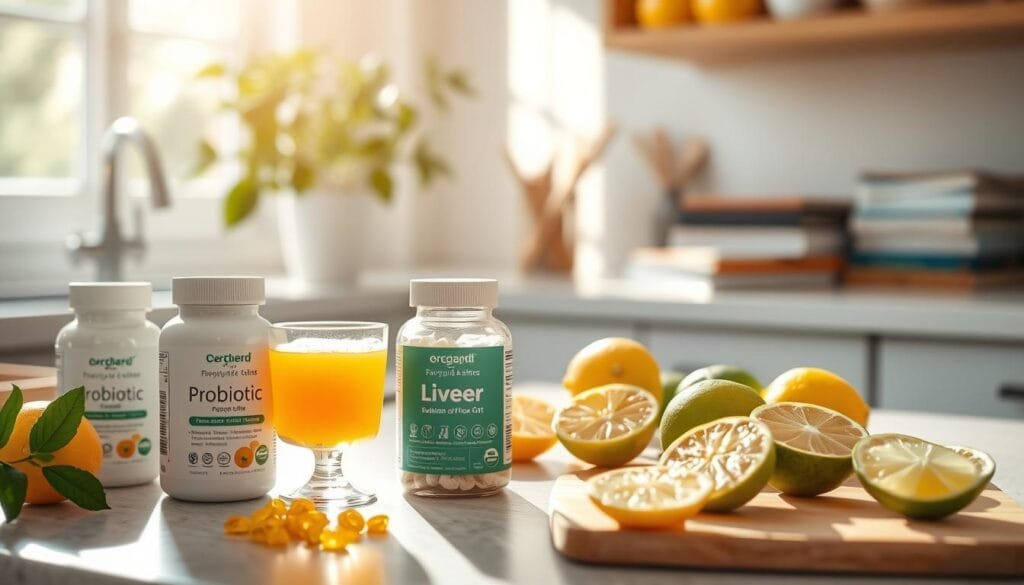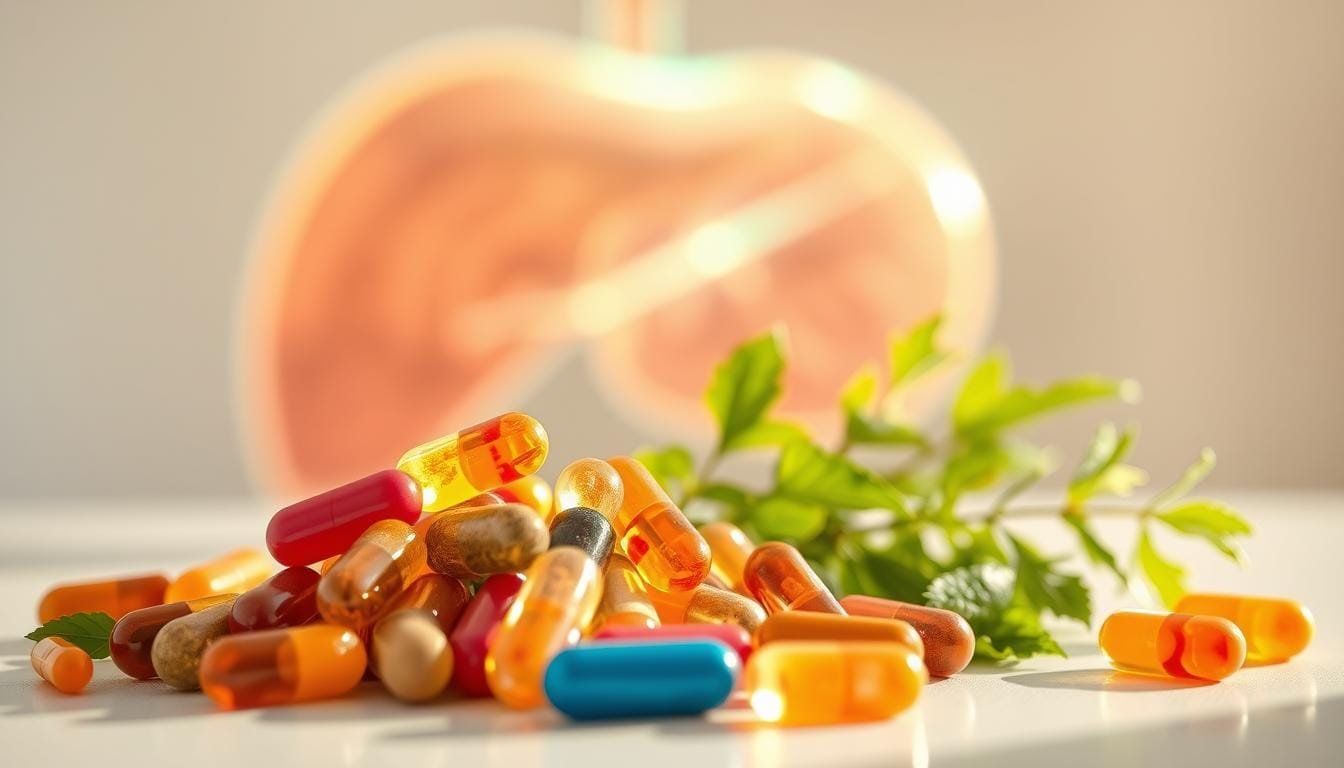Currently Empty: RM0.00
Did you know that nearly 24% of adults in the United States suffer from nonalcoholic fatty liver disease (NAFLD)? This condition, often linked to obesity and type 2 diabetes, is a growing concern worldwide. However, cutting-edge research reveals that a healthy gut plays a vital role in managing NAFLD and improving overall health.
Recent studies highlight how probiotics can delay NAFLD progression. These beneficial microorganisms help regulate liver enzyme levels, reduce inflammation, and improve metabolic functions. A balanced gut microbiome not only supports liver health but also enhances immune, heart, and brain function.
At Wellness Concept, we specialize in combining the latest research with practical solutions. Our team is here to guide you through the science and daily practices for optimal well-being. For personalized advice, reach out via WhatsApp at +60123822655 during business hours.
Key Takeaways
- NAFLD affects nearly 24% of adults in the U.S.
- Probiotics can help manage liver health and reduce inflammation.
- A balanced gut microbiome supports overall well-being.
- Wellness Concept offers expert guidance on liver detox strategies.
- Contact us at +60123822655 for personalized support.
Understanding the Gut-Liver Connection
The gut-liver axis plays a pivotal role in maintaining overall wellness. This natural connection ensures that the gastrointestinal tract and liver work together to support digestion, nutrient absorption, and toxin removal. A balanced gut microbiome is essential for this process, as it helps maintain barrier integrity and prevents harmful substances from entering the bloodstream.
The Role of the Gut Microbiome
The gut microbiome consists of trillions of microorganisms that aid in digestion and nutrient absorption. These bacteria and other microbes play a complex role in breaking down food, producing essential vitamins, and supporting immune function. When the microbiome is balanced, it helps protect the liver from harmful toxins.
Disruptions in the gut, such as an overgrowth of harmful bacteria, can lead to increased toxin flow to the liver. This can trigger inflammation and impair liver function. Maintaining a healthy gut is therefore crucial for overall health.
How the Portal Vein Links the Gut and Liver
The portal vein is a key component of the gut-liver axis. It carries blood from the gastrointestinal tract directly to the liver. This blood contains nutrients, toxins, and other substances absorbed during digestion. The liver then filters these substances, ensuring that harmful toxins are neutralized before they enter the bloodstream.
Here’s a breakdown of the portal vein’s role:
| Function | Description |
|---|---|
| Nutrient Transport | Carries absorbed nutrients to the liver for processing. |
| Toxin Filtration | Filters harmful substances before they enter the bloodstream. |
| Blood Flow | Ensures 75% of the liver’s blood supply comes from the gut. |
By understanding this connection, it becomes clear how a healthy gut supports liver function and overall well-being.
Probiotics and Liver Detox: A Scientific Overview
Scientific research continues to uncover the profound impact of gut health on liver function. This connection is particularly significant in managing conditions like fatty liver disease, which affects millions worldwide. Recent studies emphasize how gut bacteria play a pivotal role in liver detoxification and overall wellness.
Key Research Findings on NAFLD
Nonalcoholic fatty liver disease (NAFLD) is a growing concern, especially among overweight individuals. Research shows that probiotic therapy can significantly improve liver enzyme levels, reduce insulin resistance, and regulate lipid metabolism. For example, a study involving high-fat diet models found that probiotics reduced hepatic fat accumulation and inflammation.
Another clinical trial highlighted the benefits of specific strains like Lactobacillus and Bifidobacterium. These strains not only improved liver function but also enhanced gut barrier integrity, preventing harmful toxins from entering the bloodstream.
Mechanisms Behind Probiotic Benefits for the Liver
Probiotics support liver health through several mechanisms. They regulate liver enzymes, reduce oxidative stress, and lower inflammation. By strengthening the intestinal wall, they minimize bacterial translocation and endotoxemia, which are common contributors to liver damage.
Here’s a breakdown of how probiotics work:
| Mechanism | Effect |
|---|---|
| Enzyme Regulation | Improves liver enzyme levels, reducing liver stress. |
| Inflammation Reduction | Lowers pro-inflammatory cytokines, protecting liver cells. |
| Gut Barrier Support | Prevents harmful toxins from reaching the liver. |
These findings provide a trusted foundation for the recommendations shared later in this article. For more insights on daily probiotic use, explore our detailed guide on probiotic safety and benefits.
Benefits of Probiotics for Liver Health
Maintaining a healthy gut can significantly improve liver function. Recent studies reveal that beneficial bacteria play a crucial role in reducing inflammation and optimizing liver enzyme levels. These findings highlight the importance of a balanced gut microbiome for overall well-being.
Improvement of Liver Enzyme Levels
Clinical trials show that probiotic supplementation can lower liver enzyme levels, such as ALT and AST. For example, a meta-analysis of 10 studies found a 17% improvement in liver enzyme markers after 28 weeks of probiotic use. This reduction reflects better liver performance and reduced stress on the organ.
Another study involving overweight participants demonstrated that specific strains like Lactobacillus and Bifidobacterium improved liver function. These strains also enhanced gut barrier integrity, preventing harmful toxins from reaching the liver.
Regulation of Lipid Metabolism and Inflammation
Probiotics help regulate lipid metabolism, which is essential for liver health. By reducing oxidative stress and lowering inflammation, they protect liver cells from damage. A study involving high-fat diet models found that probiotics reduced hepatic fat accumulation by 46%.
These beneficial bacteria also produce short-chain fatty acids (SCFAs), which have anti-inflammatory properties. This effect not only supports liver health but also improves overall metabolic function.
For more insights into the health benefits of probiotics, explore our detailed guide. Integrating probiotics into your daily routine can lead to significant improvements in liver health and overall wellness.
Probiotics and liver detox in Everyday Health
Daily habits can shape the health of your gut and liver. By making simple choices, you can support the gut-liver axis and improve overall wellness. This connection is vital for maintaining balance and ensuring your body functions optimally.

Supporting the Gut-Liver Axis Effectively
Regular intake of probiotics helps maintain the delicate balance of the gut-liver axis. These beneficial microorganisms strengthen the intestinal barrier, reducing the flow of harmful toxins to the liver. This process eases the liver’s detoxification workload, promoting better function.
Practical methods to support gut health include consuming fermented foods like yogurt, kefir, and sauerkraut. These foods introduce beneficial bacteria into the gut, enhancing its microbiome. Additionally, reducing processed foods and sugar intake can prevent disruptions in gut flora.
A balanced gut leads to improved overall body health. It reduces inflammation, supports metabolic functions, and lowers the risk of chronic conditions. Studies show that a healthy gut microbiome can significantly improve liver enzyme levels, reflecting better liver performance.
Here’s how probiotics contribute to gut-liver health:
| Benefit | Effect |
|---|---|
| Gut Barrier Support | Prevents harmful toxins from reaching the liver. |
| Inflammation Reduction | Lowers pro-inflammatory markers, protecting liver cells. |
| Enzyme Regulation | Improves liver enzyme levels, reducing stress on the organ. |
Integrating probiotics into your daily diet can lead to sustained health improvements. Whether through supplements or fermented foods, these beneficial bacteria play a key role in maintaining gut health and supporting liver function.
Effective Probiotic Strains for Liver Wellness
The right probiotic strains can make a significant difference in liver wellness. Recent studies highlight the benefits of specific microorganisms in improving liver markers and supporting overall health. Strains like Lactobacillus and Bifidobacterium have shown promising results in enhancing liver function.
Notable Strains: Lactobacillus and Bifidobacterium
Certain strains of Lactobacillus and Bifidobacterium are particularly effective for liver health. For example, Lactobacillus rhamnosus has been shown to reduce liver enzyme levels and improve gut barrier integrity. Similarly, Bifidobacterium species help regulate lipid metabolism and lower inflammation.
These bacteria work by strengthening the intestinal wall, preventing harmful toxins from reaching the liver. This process supports the organ’s detoxification function and reduces stress on its cells.
Long-Term Use and Dosage Insights
For optimal results, long-term use of probiotics is essential. Studies suggest that a minimum of 12 weeks is necessary to see significant improvements in liver markers. Dosage recommendations typically range up to 30 billion CFU per day, depending on the strain and formulation.
Here’s a breakdown of effective strains and their benefits:
| Strain | Benefits |
|---|---|
| Lactobacillus rhamnosus | Reduces liver enzyme levels, improves gut barrier. |
| Bifidobacterium breve | |
| Lactobacillus paracasei | Supports detoxification, enhances liver function. |
Selecting high-quality supplements backed by clinical research is crucial. For more insights on probiotics for liver health, explore trusted resources.
Informed choices, combined with proper lifestyle practices, can significantly enhance liver wellness. By focusing on the right strains and consistent use, individuals can support their liver’s health and overall well-being.
Lifestyle Strategies to Enhance Liver Detox
A healthy lifestyle can naturally boost your body’s detox processes. By focusing on nutrition, exercise, and toxin avoidance, you can support your body’s natural ability to cleanse and function optimally. These strategies not only improve overall health but also enhance specific systems like digestion and metabolism.

Nutrient-Dense Diet and Cleansing Foods
A balanced diet rich in nutrient-dense foods is essential for detox support. Foods like leafy greens, garlic, and turmeric are known for their cleansing properties. These ingredients help reduce oxidative stress and support metabolic functions.
Incorporating the Mediterranean diet can be particularly beneficial. This approach emphasizes whole grains, lean proteins, and healthy fats, which promote digestion and overall wellness. Reducing processed foods and sugary drinks also minimizes the burden on your body’s detox systems.
Regular Exercise and Avoidance of Toxins
Physical activity plays a crucial role in enhancing metabolism and supporting detox processes. Regular exercise, such as brisk walking or yoga, improves blood circulation and helps eliminate toxins through sweat.
Additionally, avoiding environmental toxins is vital. Opt for natural cleaning products and reduce exposure to harmful chemicals. Managing your weight through steady activity levels can further support your body’s detox functions.
Consistent lifestyle changes over time lead to lasting improvements. By combining a nutrient-rich diet, regular exercise, and toxin avoidance, you can enhance your body’s natural detox processes and achieve better health.
Contact Wellness Concept for Personalized Guidance
Managing liver health requires expert guidance tailored to individual needs. At Wellness Concept, we understand that every body is unique, and so are the challenges it faces. Whether you’re dealing with a specific condition or looking to prevent potential issues, our team is here to help.
For immediate assistance, reach out via WhatsApp at +60123822655. This convenient method allows you to connect with our experts quickly and efficiently. Whether you have questions about liver disease or need advice on detox strategies, we’re just a message away.
Business Hours and Service Availability
Wellness Concept is available to support you during the following hours:
- Monday to Friday: 9:30 am – 6:30 pm
- Saturday: 10 am – 5 pm
- Sunday: Closed
Our team is dedicated to providing personalized strategies that address your specific needs. From managing liver disease to improving overall wellness, we ensure every client receives the attention they deserve.
Don’t let a health issue go unaddressed. Contact us today to start your journey toward better health and lasting results.
Conclusion
Supporting your body’s natural processes can lead to lasting health improvements. Research highlights the benefits of a balanced gut microbiome in managing conditions like fatty liver. Specific strains, such as Lactobacillus, have shown promise in reducing inflammation and improving metabolic functions.
Lifestyle strategies, including a nutrient-rich diet and regular exercise, play a crucial role. These changes, combined with informed choices, empower individuals to take control of their health. Studies suggest that consistent efforts over a week or more can yield significant results.
For personalized guidance, consider reaching out to Wellness Concept. Their expert team provides tailored strategies to help you achieve optimal wellness. Embrace these insights and take the first step toward a healthier way of life.
FAQ
What is the gut-liver connection?
The gut-liver connection refers to the relationship between the gastrointestinal tract and the liver. The portal vein links these two organs, allowing nutrients, toxins, and microorganisms to travel between them, influencing overall health.
How do microorganisms in the gut affect liver function?
Microorganisms in the gut play a crucial role in digestion and nutrient absorption. An imbalance in these bacteria can lead to inflammation and metabolic issues, which may impact liver health over time.
Can probiotics help with non-alcoholic fatty liver disease?
Research suggests that certain strains may improve liver enzyme levels and reduce inflammation, which are key factors in managing non-alcoholic fatty liver disease.
What are the benefits of probiotics for liver wellness?
Probiotics can support liver health by regulating lipid metabolism, reducing inflammation, and improving the balance of gut bacteria, which positively impacts the gut-liver axis.
Which strains are most effective for liver health?
Strains like Lactobacillus and Bifidobacterium have shown promise in supporting liver function. Long-term use and proper dosage are essential for optimal results.
How can lifestyle changes enhance liver detoxification?
A nutrient-dense diet, regular physical activity, and avoiding harmful toxins can significantly improve liver function and support the body’s natural detoxification processes.
Where can I get personalized guidance for liver wellness?
For tailored advice, contact Wellness Concept at +60123822655 during business hours. Their experts can provide insights based on individual health needs.



